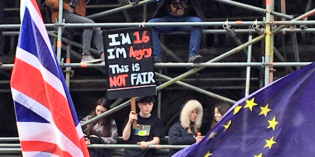Informing and engaging citizens

Our student generation has been disenfranchised
The latest generation of university undergraduates has been excluded from participating in an issue that will shape their future, leaving the EU. Chris Game details how this came about, and how approaches to youth participation now divide the parties and the nations of the UK.

It’s time to change election campaign law to stop politicians lying
How do you ensure that political campaigns don’t rely on lies and misinformation? James Organ proposes changing election campaign law to prohibit knowingly false political statements by campaigners, and suggests that involving voters, via a citizens’ assembly, could be one way to ensure the quality of political information improves in any referendum.

Youth political engagement in the EU: The age of a democracy accounts for variations in levels of youth participation
While socio-demographic characteristics (at individual level) matter for levels of political participation, country-level characteristics have an effect as well. Magdelina Kitanova shows that the democratic maturity of a country influences patterns of political participation among young people in the EU. Youth political engagement varies significantly, and young individuals living in established democracies are more likely to be politically active.

Evidence from Germany: what citizens want from democracy
Although democracy is viewed positively across Europe, surprisingly little is known about the type of democratic processes citizens support. Drawing on new research in Germany, Saskia Goldberg, Dominik Wyss and André Bächtiger illustrate that disenchanted citizens want stronger involvement in political decision-making, irrespective of the concrete participation format.

Improving access to information and restoring the public’s faith in democracy through deliberative institutions
Advocates for public deliberation claim that increased citizen involvement in political decision-making can improve democratic governance. Studies have shown that deliberation can be beneficial for participants, but less is known about its impact on the wider public. Looking at the case of Citizens’ Initiative Reviews in Oregon, Katherine R. Knobloch shows that knowing about or using the information provided by deliberative institutions can improve the public’s faith in self-government.

What do British newspaper readers think about Brexit?
The various Brexit allegiances of Britain’s newspapers are clear. But what do their readers think? Heinz Brandenburg analyses data from the British Election Study Internet Panel to find out how intransigent – or open to compromise – their readers are, and how readerships have shifted since Brexit.

The Brex Factor: how a citizens’ assembly on Brexit could learn from reality TV
Some politicians and political scientists have suggested that a citizens’ assembly would be the best way to build public consent for any Brexit solution. For this to work, argues Conor Farrington, any initiative would need to innovate to engage the public, and in this it could learn from mass television entertainment.

Representing interest groups: umbrella organisations enjoy preferential access to the legislative arena but not to the media
Lobbying for access to parliamentary and media debates potentially allows organisations to represent the interests of their members and exert political influence. Wiebke Marie Junk looks at which types of interest groups are favoured when it comes to lobbying access in the United Kingdom and Germany. She finds that access to the legislature is higher for ‘umbrella’ organisations that unite many member groups, while representing a higher number of individual people does not seem to matter.




 Democratic Audit's core funding is provided by the Joseph Rowntree Charitable Trust. Additional funding is provided by the London School of Economics.
Democratic Audit's core funding is provided by the Joseph Rowntree Charitable Trust. Additional funding is provided by the London School of Economics.